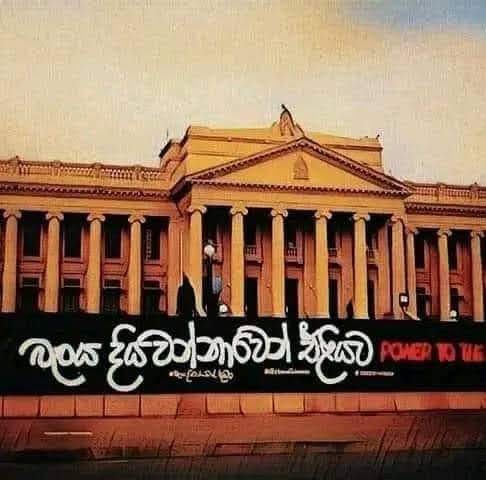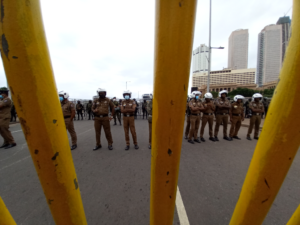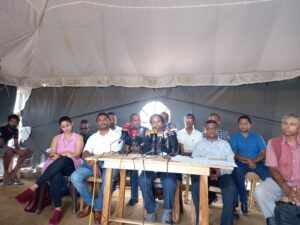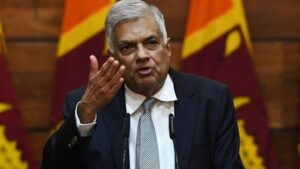
The July 9th uprising is a revolutionary moment. The people have spoken, in their millions, in the midst of a grave economic collapse, demanding change and clamouring for greater democracy. They pointed out the dire failure of the political leadership at the top. Gotabaya Rajapaksa fled overseas, without resigning, holding the country to ransom; and Ranil Wickremesinghe, who promised to resign, was made Acting President and is using the arbitrary powers of the office of the President to take control of the government. Wickremesinghe continues the same authoritarian political dispensation that has brought this country to its knees.
In this context, Parliament must act. An all-party caretaker government must be formed immediately to steer the country through this difficult time of economic and political instability. The need at this point is to make governance truly democratic, or at least as widely democratic as possible. One of the greatest impediments to democratic forms of representative governance is the Executive Presidency.
The Executive Presidency is the bane of our governance structure, holding back change and impeding democratic action. The key feature of the Executive Presidency is that arbitrary powers are centred on a single political figure, lending itself to authoritarianism. The enormous power centred on a single figure of authority has led to the creation of a charismatic leader with a cult-like following, with power vested in the aura, the demeanour, and the political stamina of a single individual. The presence of such a figure has in turn created and nurtured a culture of political patronage and corruption; it has created lines of engagement between the President and other nodes of power at the centre and in the peripheries, undermining the power of elected representatives and constituencies. Political patronage has made power brokering a central feature, leaving out the weaker sections of the population and making them beholden to corrupt politicians. Elected representatives seek favours from the central authority instead of caring for their constituencies. The people rely on favours and the crumbs that fall from the table of the ‘mighty’.
In the process of bringing about change and of constitution making, we may have to explore forms of governance that make Parliament the centre, a structure inclined toward a modified form of the Westminster model. Simultaneously, we need to explore ways in which direct democratic processes can complement this with structures like People’s Councils, for instance, a detail that needs to be discussed widely.
OUR DEMANDS
The people in unison have challenged the political order, its deeply hierarchical nature and the structure of political governance. A political leadership committed to the welfare of the people is the imperative of this hour. We demand from those who are our elected representatives in the Parliament, and on whose shoulders now falls the responsibility of steering the country through an economic disaster, that they put aside party affinities and interests. This moment of uncertainty must not be used to further any single party’s or person’s personal political agenda.
We demand that:
- The parliamentarians form an all-party interim government.
- The interim government elect a President to act as a caretaker head, who will be led by the Parliament and not act arbitrarily.
- The interim government work in consultation with communities and organisations outside of the Parliament in resolving the crisis.
- The interim government take all measures necessary to facilitate the process of abolishing the Executive Presidency in the immediate future.
- The interim government be cognizant of their limited legitimacy and commit to a prescribed agenda. Their mandate is to see the country through the crisis and to ease the suffering of the people. Any institutional change and transformation of economic policy must be carried out only by an elected body that has the mandate to do so.
- The interim government commit to elections at a reasonable date in the near future and avoid using the interim period to consolidate the political positions and agendas of the different parties they belong to.
Power to the People!
Economic Stability and People’s Welfare our Slogan!
Statement issued by the Kuppi Collective following the People’s protest on July 9th 2022.
Image: Presidential Secretariat with a banner across it in Sinhala that reads, “Power beyond the Diyawanna Oya (Parliament)”. Credit: Unknown.



